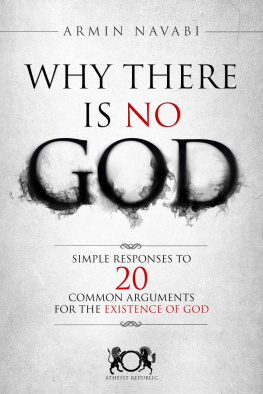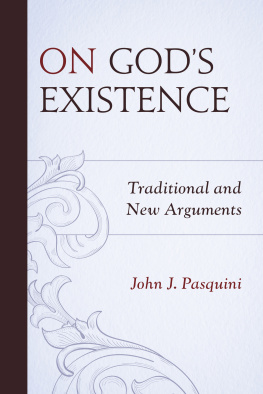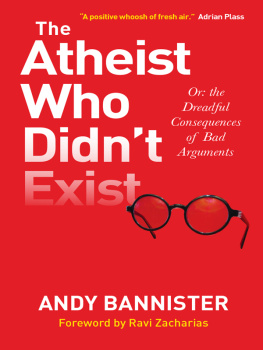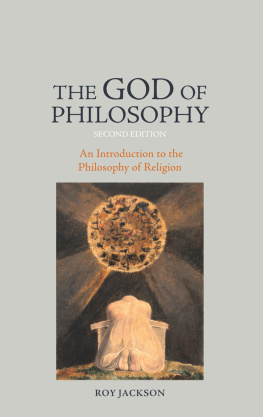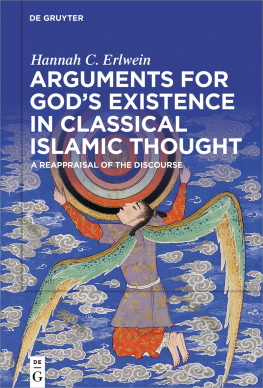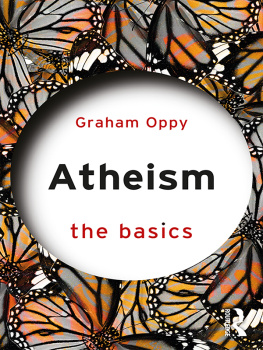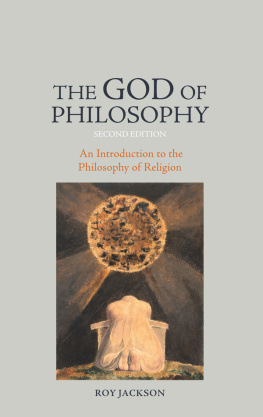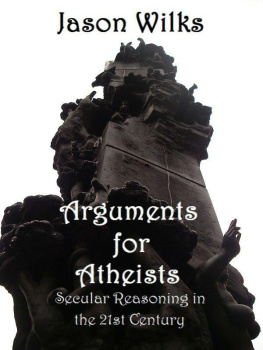
To Dad, who showed me the value of learning.
To Mom, who showed me the value of caring.
Contents
This book is meant to provide to-the-point and easy-to-understand counterarguments to many of the popular arguments made for the existence of God. Each chapter presents a short and simple explanation of the argument, followed by a response illustrating the problems and fallacies inherent in that claim.The tools offered in this book should offer you a solid foundation for building your own inquiry about the concept of God.
Who Is This Book For?
This book is written for atheists, believers and the undecided who find the concept of God an important one to examine critically and worth discussing. This book acts as a basic introduction to the debate about God, providing a springboard for new ideas to be formed and discussed.
For the already-convinced atheist, this book can help you better articulate your point of view in discussions, giving you guidance for how the reasoning behind your disbelief in God can be discussed. As an atheist, you're bound to encounter some or all of these arguments eventually when interacting with believers; understanding these arguments and seeing how others have approached them in logical ways can help you handle the same discussions.
As a believer, you may find that you disagree with much of what is said here, and that's okay. Reading this book will allow you to see what many atheists believe and how some people may question the beliefs that you hold. If you plan to defend your faith in discussions, this book can help you understand the reasoning behind the lack of belief in your opponents. Knowing this will help you debate from a more informed position, and the atheists you talk to may appreciate the fact that you've taken time to understand and consider their arguments. Knowing and appreciating the opponent's point of view can help you start a productive discussion regarding God and religion in a more constructive way.
For people who are yet undecided on the subject of God, the arguments in this book can help provide a baseline for discussion or further research about the existence of God. By reviewing many of the common arguments for the existence of God and rebuttals to them, you will have a solid foundation to use as the base of your own analysis, research and reflection.
Understanding the Burden of Proof
One concept you'll see come up repeatedly in this book is the idea of the burden of proof. During any debate, it's the job of a person making a claim to provide support, evidence and reasoning for that claim. It simply doesn't make sense to make an unfounded claim with no evidence to back it and demand that the other person to either agree with you or disprove your unfounded statement.
To better understand how the burden of proof works, consider an example by Matt Dillahunty from The Atheist Experience TV show. Imagine that you're given a jar full of beans. You have no idea how many beans are in the jar, but you know that it must be either an even or an odd number. With no supporting evidence one way or the other, however, you could not say for sure whether the jar contained an even or odd number of beans. If you were to claim that it was one or the other, you would need some supporting evidence or logical reasoning. Otherwise, your claim would simply be a random guess.
The burden of proof is a necessary part of any debate, regardless of the topic being discussed. Its utility in facilitating discussion is so well established that it's required in legal proceedings as well; the prosecution must prove beyond a reasonable doubt that the defendant is guilty.
In the case of debates about God, the burden is on the believer to offer support for her position if she wishes it to be considered seriously. In reality, the only necessary argument against believing in God is simply that there is no evidence that any gods exist. An atheist doesn't need to justify her lack of belief any further. This keeps the burden of proof on the side of the claimant where it belongs. The person making a claim has to provide the evidence for its validity. Would you believe in the claim that flying pineapples exist until proven wrong without any evidence? Probably not. You would withhold belief until there is evidence to support such a claim.
All the same, it's sometimes valuable to point out the fallacies in a claimants argument. At the very least, this creates constructive discussion where all points are considered and examined. This can also introduce doubt, causing the other person to reconsider his or her position or consider searching for evidence before accepting a claim.
Can We Say with Certainty That There Is No God?
Atheism exists on a spectrum. Some atheists claim absolute certainty in Gods nonexistence. Others simply remain unconvinced and refuse to believe in a deity without compelling evidence. However, once one has a high enough level of certainty about something, they usually treat it as certain for the sake of practicality.
After all, I cannot say with absolute certainty that my wife is not a professional assassin hired by the People's Republic of China to exterminate me. But I don't spend time worrying about the possibility because there is no evidence whatsoever to support it. The same is true for the existence of God, although my wife being an assassin is actually more likely; that scenario, at least, would fall within the known scientific laws without contradicting the prevailing models explaining the universe.
Is There Any Value in Debate?
Many of us grew up in religious environments and began questioning what we had been taught by family, friends or the community in general. Finding the language to talk about those doubts is a challenge, though, and having the support of others who have covered that ground is valuable.
Even if you're not changing anyone's mind, examining different arguments can help hone your own skepticism and critical thinking skills. Furthermore, some of the people you meet may be doubtful or insecure about their religion but do not know how to express those doubts; introducing them to these arguments and counterarguments might empower them to learn more and provide a better understanding of their own doubts and questions.
Whether you're using this reference as a way to validate your own views, arm yourself for debates or simply analyze the concepts of God and religion on a critical and exploratory way, this guide will provide thorough responses to 20 common arguments for the existence of God. Each chapter will introduce the claim before deconstructing it, providing sources for further study wherever relevant.
What Do We Mean by God?
For most of this book, well consider a god to be a conscious, supernatural being that is responsible for creating and/or sustaining the entire world or some major attributes of the world and the rules that govern it, including some examples from the Christian and Islamic definitions of God. Well also consider theism to be the belief in this definition of a god or gods. In Chapter 13, well consider some other definitions for God, including deistic and pantheistic (but more on that later). For an objective overview of more views and ideologies about God, visit WhatAreGods.com .
Who Are We?
This book was written by Armin Navabi, a former Muslim from Iran and the founder of Atheist Republic, a non-profit organization with upwards of a million fans and followers worldwide that is dedicated to offering a safe community for atheists around the world to share their ideas and meet like-minded individuals. Atheists are a global minority, and it's not always safe or comfortable for them to discuss their views in public.
Next page
